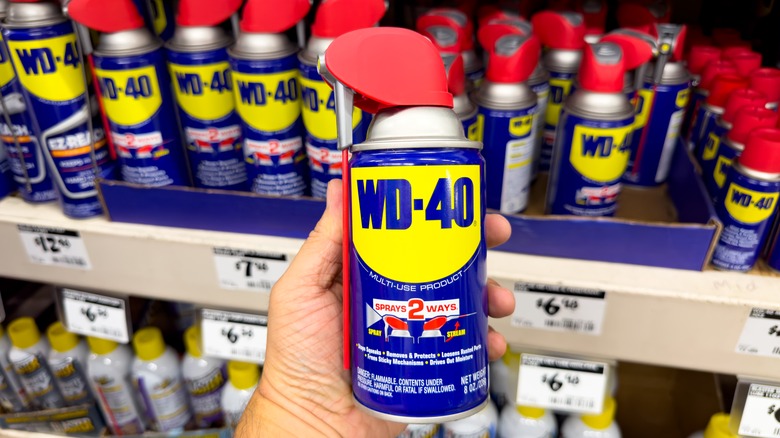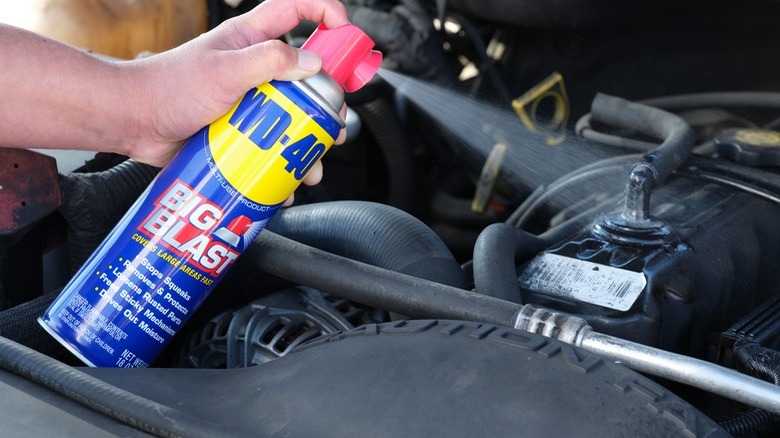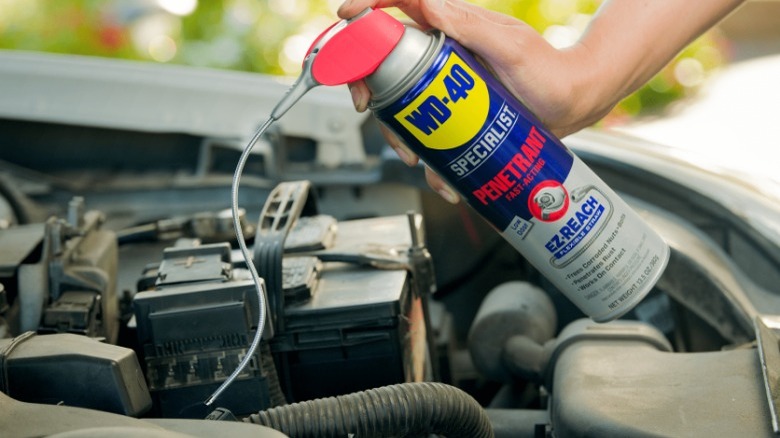Is WD-40 A Penetrating Oil? What You Should Know Before Using
WD-40 Multi-Use is one of those products that you can find in just about every household. There are hundreds of different applications for this handy solution, ranging from practical uses around your garage, to useful hacks you might not have anticipated. In fact, basic WD-40 has so many uses that people have a tendency to use it as a catch-all for all of their machine cleaning and lubricating needs. It isn't always the best product for every job, though.
There are a lot of applications that call for penetrating oil. This is a thinner compound that's designed to work its way under rust and into the narrow grooves found in machined metal, such as the threading around a screw, to reach parts of a machine that a more viscous solution wouldn't be able to access. Some people have wondered if WD-40 is a penetrating oil. The answer to that is a bit more complicated than you might think. WD-40 isn't just the name of a product, it's also the name of the brand, and the WD-40 company makes a line of several different degreasers, rust inhibitors, and lubricants. So while the standard Multi-Use formula has limited penetrating capabilities, WD-40 does make a penetrating oil as part of its product line.
WD-40 Multi-Use isn't considered a penetrating oil
The exact formula for WD-40 Multi-Use Product is a carefully guarded secret, but the Material Safety Data Sheet for it reveals that it is primarily composed of three ingredients: Aliphatic hydrocarbon, petroleum base oil, and carbon dioxide. This combination of ingredients is good for breaking down rust, cleaning out gunked-up machine parts, and displacing water that's been trapped inside metal mechanisms. Because of this composition, the compound essentially has the penetrating power of basic mineral oil.
You can use it on eroded surfaces, to clean out larger gaps like those between hinge plates, and even to get into some areas like the adjustment screw on a crescent wrench. The aerosol can and straw attachment also help to propel the substance into hard-to-reach places.
This has led many to believe that the Multi-Use formula can be used in place of a penetrating oil, but this simply isn't the case. According to Fuel and Friction, "Penetrating oils are generally made out of a blend of lower alkanols, lower alkyl benzenes, alkyl succinic acid, tert-dibutyl-p-cresol, polymethacryalate, zine dialkyl thiophsphate, and methyl silicone in a stock of paraffin bright stock lube oil." This high alcohol content lowers the viscosity of the oil so that it can more easily seep into the much narrower gaps and threading that regular oil-based solvents like WD-40 Multi-Use wouldn't be able to reach.
WD-40 does have a penetrant formula
Those who are looking for penetrating oil for a specific project don't need to buy WD-40 specifically. 3-In-One and PB Blaster are both popular options that you can find readily available at most major hardware retailers. These tend to be much cheaper than most WD-40 brand sprays, and any of them will do the job better than WD-40's regular Multi-Use Product. That said, there are a lot of WD-40 fans out there who prefer to use the company's products.
Fortunately, WD-40 does make a Specialist Penetrant formula. The company claims that this "is a fast-acting penetrant with capillary action to penetrate deep into crevices, threads, and seams to break the rust bonds that hold stuck parts together." WD-40 also states that this solution is low odor, that it works 50% faster than options from competing brands, and that it offers three times more protection from erosion after it is applied. WD-40 also boasts that its penetrant formula is safe to use on rubber and plastic parts as well as metal–a common mistake that a lot of people make when using the regular Multi-Use Product. This spray should work for any application that calls for penetrating oil.


